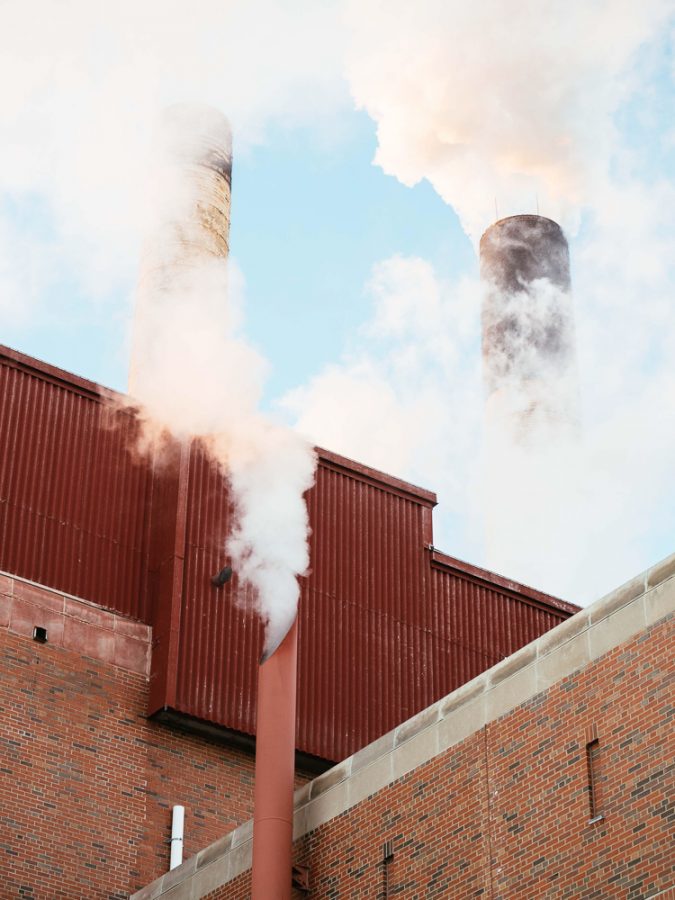Power plant replacing 77-year-old stack due to facility upgrade
Water vapor comes out of the Abbott power plant’s main chimneys. The University of Illinois is ignoring their commitment to the Illinois Climate Action Plan 2020 (iCAP) by making empty promises.
April 17, 2017
After 77 years of operation, the south energy stack at Abbott Power Plant is scheduled to be taken down and replaced with low emission natural gas boilers.
The project is a part of the Utilities Production and Distribution Master Plan.
Mike Larson, director of utilities production at facilities and services, said the total project budget is $22.5 million, which includes design, equipment, construction and contingency money for unforeseen circumstances.
Larson said that the five-year plan includes understanding the current energy demand and predicted growth of the campus, so that the power plant can provide utility needed to meet the needs of the University.
“We had boilers in place that were actually past the end of their useful lives,” Larson said. “One of (the power plant’s) main deliverables for the campus is reliable steam and electricity.”
Get The Daily Illini in your inbox!
Larson said the process of taking down the old smoke stack started about a week ago, and the removal of the external material will be completed by the end of April.
The new boilers are expected to be operational by December. He said that the electricity and heating of the University will not be affected.
“The first thing that we focus on is safety. The second piece we focus on is environmental compliance, and then the reliability, and lastly, cost effectiveness,” Larson said. “The plan is nobody will notice anything different.”
While the University has multiple sources for electricity, Abbott Power Plant is the only provider of steam for heating, Larson said.
“If Abbott stops running — if the equipment stops running — we don’t have the means to supply steam for campus,” he said.
Larson said one of the biggest benefits of the new boilers is that they generate higher-pressure steam, allowing the turbines to operate more efficiently.
Michael Brewer, mechanical engineer at Abbott Power Plant, said the new boilers will also be more environmentally friendly, so the new stacks do not need to be as tall as the old ones.
Brewer said the engineers of the original smoke stack from 1940 wanted a certain height because the coal boilers lacked sufficient pollution control devices.
While the old smoke stack was originally over 200 feet tall, the top was shaved off, leaving it to stand at 197 feet. The new stacks are designed to be 119 feet tall and will be made out of steel instead of concrete to be more cost-efficient.
“The exhaust (from our new gas boilers) has small amounts of other materials besides water, carbon dioxide, oxygen, nitrogen (and) a little bit of sulfur dioxide or trioxide, in levels that are well below anything that will be irritating,” Brewer said.
He said that the power plant is not only making changes to the structure, but they are also trying to develop staff leadership, improve overall quality of operation and become more accessible to students by offering tours of the facilities.
“We try and look 15, 20 years in the future and plan for what we need to do to stay current, so we can stay reliable, environmentally friendly and be cost competitive,” said Russell Reynolds, chief utility plant operating engineer.
He said that the goal of Abbott Power Plant is to serve the University, and provide the best service they can.
“The good thing about a power plant is it affects everyone on campus, and really the only time when people know we’re here is when we screw up or mess up,” Reynolds said. “For us to be reliable and provide the energy the campus needs, we need to keep our equipment in good shape and running, and that’s the reason to change the boilers out.”







